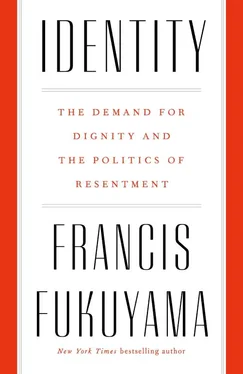The view that self-esteem is based on an individual’s ability to follow certain substantive social rules—to possess virtues —is a much more traditional understanding of human dignity. But since not everyone is virtuous, this understanding of esteem stands at odds with the report’s desire to affirm everyone’s intrinsic worth. This points to an inherent tension between isothymia and megalothymia. Megalothymia does not just reflect the vanity of the ambitious; it constitutes the just deserts of the virtuous. Some people need to be valued at a lower rate than others. Indeed, if one cannot feel shame—that is, low self-esteem—for having done bad things to other people, it is hard to see how one can ever come to accept responsibility for others. Nonetheless, the task force’s report in two succeeding bullet points recommends that the state educational system simultaneously “serve to liberate rather than domesticate,” and yet “promote responsible character and values.” One can almost hear the liberal members of the task force arguing in the pages of the report for greater inclusiveness, the more conservative ones worrying about the consequences of this for social order, and the liberal ones responding in turn that “we can’t be judgmental if we are to promote self-esteem.”
The California task force report was widely mocked at the time, becoming the target of the Doonesbury comic strip for several months. The effort to raise everyone’s self-esteem without being able to define what is estimable, and without being able to discriminate between better and worse forms of behavior, appeared to many people to be an impossible—indeed, an absurd—task. Yet in the succeeding years, this agenda took on a life of its own and became the objective of a large number of social institutions such as nonprofits, schools, and universities, and of the state itself. One reason that identity politics has become so embedded in the United States and other liberal democracies is because of rising concern over self-esteem, and by what has been labeled “the triumph of the therapeutic.”
The latter refers to a 1966 book written by the sociologist Philip Rieff, who argued that the decline of a shared moral horizon defined by religion had left a huge void that was being filled by psychologists preaching a new religion of psychotherapy. Traditional culture, according to Rieff, “is another name for a design of motive directing the self outward, toward those communal purposes in which alone the self can be realized and satisfied.” As such it played a therapeutic role, giving purpose to individuals, connecting them to others, and teaching them their place in the universe. But that outer culture had been denounced as an iron cage imprisoning the inner self; people were told to liberate their inner selves, to be “authentic” and “committed,” but without being told to what they should be committed. The void left by priests and ministers was now being filled by psychoanalysts using therapeutic techniques “with nothing at stake beyond a manipulatable sense of well-being.” {5} 5 Philip Rieff, The Triumph of the Therapeutic: Uses of Faith After Freud (Chicago: University of Chicago Press, 1966), 4, 13.
Rieff’s critique of the therapeutic spawned an entire genre of social commentary in the next generation whose target was the modern model of identity itself. {6} 6 For an overview see Katie Wright, The Rise of the Therapeutic Society: Psychological Knowledge and the Contradictions of Cultural Change (Washington, DC: New Academia Publishing, 2010), 13–28.
The original therapeutic model was built around the discovery of hidden identity. Sigmund Freud came to his psychological insights treating Viennese women crippled by what he labeled hysteria, an intense unconscious repression of their natural sexuality, driven by what Freud would come to call the superego. Freud’s account of the inner self shifted over time, from memories of childhood abuse to projected sexual fantasies; in either case, therapy rested on the recovery of knowledge of the provenance of the person’s condition. Freud remained morally neutral in the standoff between the inner self and the demands of society, recognizing that both had powerful claims; if anything, he was on the side of society. But he was part of an “unmasking trend,” in Lionel Trilling’s words, founded on the belief that “beneath the appearance of every human phenomenon there lies concealed a discrepant actuality and that intellectual, practical and (not least) moral advantage is to be gained by forcibly bringing it to light.” {7} 7 Lionel Trilling, Sincerity and Authenticity (Cambridge, MA: Harvard University Press, 1972), 142.
Many of Freud’s followers, such as Herbert Marcuse, and those in subsequent psychiatric traditions, were less neutral than Freud and saw their role as that of liberators of the individual against a broadly repressive society.
The affirmation of inner identity depended, in the final analysis, on the truth of Rousseau’s assertion that human beings were fundamentally good: that their inner selves were sources of limitless potential (what Rousseau called perfectibility), and that human happiness depended on the liberation of that self from artificial social constraint. That was certainly the starting assumption of the human potential movement and the California task force.
But what if Rousseau was wrong and that inner self was, as traditional moralists believed, the seat of asocial or harmful impulses, indeed of evil? Some in the human potential movement saw Friedrich Nietzsche as one of their progenitors. But Nietzsche was ruthlessly honest in foreseeing the consequences of personal liberation: it could just as easily pave the way for a post-Christian morality in which the stronger ruled the weaker, rather than a happy egalitarian outcome. Adolf Hitler would end up doing nothing more than following his inner star, as countless college graduates are constantly enjoined to do.
This was exactly the critique made in the late 1970s by Christopher Lasch, who argued that the promotion of self-esteem enabled not human potential but a crippling narcissism, indeed, a narcissism that he felt had come to characterize American society as a whole. People were not liberated to fulfill their potential; rather, they were trapped in emotional dependence: “Notwithstanding his occasional illusions of omnipotence, the narcissist depends on others to validate his self-esteem. He cannot live without an admiring audience.” This had hugely negative social implications:
Even when therapists speak of the need for “meaning” and “love,” they define love and meaning simply as the fulfillment of the patient’s emotional requirements. It hardly occurs to them—nor is there any reason why it should, given the nature of the therapeutic enterprise—to encourage the subject to subordinate his needs and interests to those of others, to some cause or tradition outside himself.
In an American context, Lasch argued that narcissism as a social phenomenon would lead not to fascism, but to a broad depoliticization of society, in which struggles for social justice were reduced to personal psychological problems. {8} 8 Christopher Lasch, The Culture of Narcissism: American Life in an Age of Diminishing Expectations (New York: Norton, 1978), 10, 13.
Lasch wrote well before the rise of Donald Trump, a political figure who almost perfectly embodies the narcissism he describes. Narcissism led Trump into politics, but a politics driven less by public purposes than his own inner needs for public affirmation.
Moralists such as Rieff and Lasch may have been right about the social consequences of a therapeutic society. But by the time they wrote, an entire psychiatric profession had arisen, whose members did not see themselves simply as scientists observing natural phenomena; they were also doctors with a therapeutic calling to heal their patients and make them more functional. Ordinary people who wanted to feel better about themselves created a huge demand for their services. Freudian psychoanalysis in the last decades of the twentieth century went into a long-term decline in the United States, but the underlying therapeutic model continued to gain ground, and psychological language began to permeate the popular culture of developed societies. For example, the term self-esteem was virtually absent from U.K. newspapers in 1980, but references to low self-esteem began to rise steadily to well over thirty-three hundred by the year 2000. Psychological counseling expanded, with a fourfold increase in the number of mental health professionals between 1970 and 1995. {9} 9 Frank Furedi, Therapy Culture: Cultivating Vulnerability in an Uncertain Age (London: Routledge, 2004), 4–5, 10.
Читать дальше












